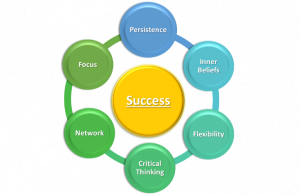The following is an article review of “The Core Traits of Success” by David G. Jensen. Dr. David G. Jensen is a writer, a world-wide speaker on career issues, and the founder of CareerTax Inc. He has written about the issues that scientists and engineers face when transitioning from an academic environment to the industrial employment. In his article, The Core Traits of Success, Dr. Jensen reflects on the traits needed to have a successful career. Very early on in his career he became interested in what makes a scientist stand out. Through his conversation with a person at a biotech company, he learned about the traits that many recruiters and hiring managers usually look for in a candidate. These traits were persistence, focus, inner beliefs, flexibility, network, and critical thinking. I also agree that these are traits you must have and work on in order to be a successful, professional scientist. I also think that having a plan, setting goals, and following through are important when making your transition. For example, persistence comes in when a plan (or experiment) does not go as expected, but you do not immediately give up; you take a step back, re-evaluate the process, make adjustments, and try again. This is a trait important in every aspect of your life, especially for graduate students. Many recruiters will ask if you have ever had a recurrent problem and how you handled it. They want to know if you were able to follow through or if the stress was too much for you to bear. Be sure to keep this in mind in every aspect of your life—not just in science!  It is also important to focus on your goal. Remembering why you started doing a project or task, and what makes it important to you will help keep you motivated and stick with the plan. Dr. Jensen also discusses inner beliefs; in other words, believing in yourself. For example, scientists, especially those early on in their career, must believe in their potential, including completing publications and successfully graduating. This is a trait that I have not thought much about but have recently heard a lot people discussing. Have you ever heard the phrase “fake it until you make it”, or have seen some people do the superman pose before a talk or a surgery? These are just little tricks to give yourself self-confidence, and yes, the people that believe in this are right; when you believe in yourself and in the work you are doing you tend to perform better! The next trait that Dr. Jensen talks about is flexibility. This means being open and willing to learn new techniques. In this era, new techniques in the laboratory are quickly emerging, so we cannot stay stuck repeating the things we have already learned. We need to be flexible in order to move forward. Networking, the importance of which many of us have heard of before, is a really important trait to be successful. You need to build a network of future collaborators and potential employers. The final trait is critical thinking, which scientists are trained to do. We learn how to approach a problem from different angles and figure out the most efficient way to do it. Keep in mind that when looking for a job what will set you apart from others is how you an approach a problem and what options you have to solve it. This is what critical thinking is about, we all know the science, but the key to success is having a critical mind on how to approach the science. Jensen concludes his article by saying that the most important trait of all is having passion for what you do. Having passion for your work will help you tie together the other six traits and achieve your goals. If you want to be successful, set a goal, make a plan, follow through, and add in the six traits. Good luck!! Edits for this post was provided by Eileen Oni, Paulina Krzyszczyk and Maryam Alapa
It is also important to focus on your goal. Remembering why you started doing a project or task, and what makes it important to you will help keep you motivated and stick with the plan. Dr. Jensen also discusses inner beliefs; in other words, believing in yourself. For example, scientists, especially those early on in their career, must believe in their potential, including completing publications and successfully graduating. This is a trait that I have not thought much about but have recently heard a lot people discussing. Have you ever heard the phrase “fake it until you make it”, or have seen some people do the superman pose before a talk or a surgery? These are just little tricks to give yourself self-confidence, and yes, the people that believe in this are right; when you believe in yourself and in the work you are doing you tend to perform better! The next trait that Dr. Jensen talks about is flexibility. This means being open and willing to learn new techniques. In this era, new techniques in the laboratory are quickly emerging, so we cannot stay stuck repeating the things we have already learned. We need to be flexible in order to move forward. Networking, the importance of which many of us have heard of before, is a really important trait to be successful. You need to build a network of future collaborators and potential employers. The final trait is critical thinking, which scientists are trained to do. We learn how to approach a problem from different angles and figure out the most efficient way to do it. Keep in mind that when looking for a job what will set you apart from others is how you an approach a problem and what options you have to solve it. This is what critical thinking is about, we all know the science, but the key to success is having a critical mind on how to approach the science. Jensen concludes his article by saying that the most important trait of all is having passion for what you do. Having passion for your work will help you tie together the other six traits and achieve your goals. If you want to be successful, set a goal, make a plan, follow through, and add in the six traits. Good luck!! Edits for this post was provided by Eileen Oni, Paulina Krzyszczyk and Maryam Alapa 
iJOBS Blog